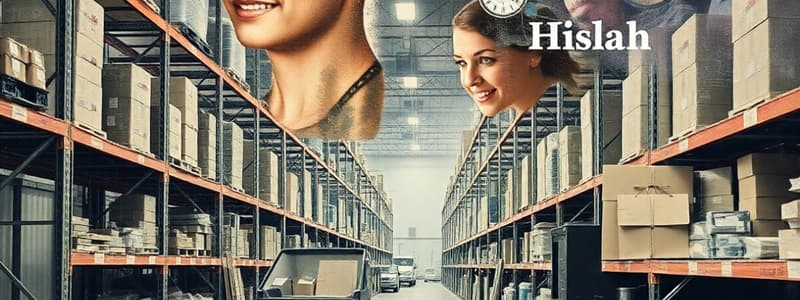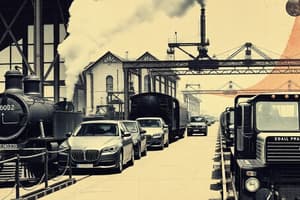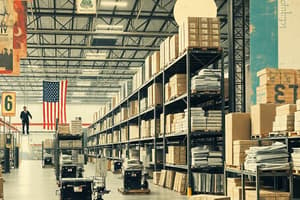Podcast
Questions and Answers
What is the primary focus of manufacturing systems logistics?
What is the primary focus of manufacturing systems logistics?
- Enhancing product design and marketing strategies
- Managing and coordinating components for efficient operations (correct)
- Reducing employee workload in the manufacturing environment
- Focusing solely on finished goods production
Which factor does NOT impact manufacturing systems logistics?
Which factor does NOT impact manufacturing systems logistics?
- Size and layout of the manufacturing facility
- Type of product being manufactured
- Employee salary structures (correct)
- Location of suppliers and customers
How does effective manufacturing logistics primarily enhance customer satisfaction?
How does effective manufacturing logistics primarily enhance customer satisfaction?
- By delivering products on time and in full (correct)
- By minimizing the amount of manual handling required
- By reducing labor costs significantly
- By increasing the complexity of the supply chain
Quality assurance and total quality management are primarily considered the responsibility of which group?
Quality assurance and total quality management are primarily considered the responsibility of which group?
What is one advantage of effective manufacturing logistics?
What is one advantage of effective manufacturing logistics?
What is the primary goal of lean production?
What is the primary goal of lean production?
Which aspect is NOT a focus of agile manufacturing?
Which aspect is NOT a focus of agile manufacturing?
Which of the following best describes the comparison between lean and agile manufacturing?
Which of the following best describes the comparison between lean and agile manufacturing?
What percentage of a product’s selling price is typically represented by its manufacturing cost?
What percentage of a product’s selling price is typically represented by its manufacturing cost?
How does lean production view the utilization of human resources?
How does lean production view the utilization of human resources?
What is a key characteristic of agile manufacturing?
What is a key characteristic of agile manufacturing?
In lean production, what is the approach towards nonproductive labor?
In lean production, what is the approach towards nonproductive labor?
Which statement correctly contrasts lean and agile manufacturing?
Which statement correctly contrasts lean and agile manufacturing?
Which factor is crucial for the success of agile manufacturing?
Which factor is crucial for the success of agile manufacturing?
What is a primary focus of continuous improvement in agile manufacturing?
What is a primary focus of continuous improvement in agile manufacturing?
Flashcards
Manufacturing Logistics
Manufacturing Logistics
Managing the flow of materials from raw materials to finished goods within a manufacturing system.
Production Planning and Scheduling
Production Planning and Scheduling
Ensuring the timely availability of materials at the right place and time in the manufacturing process.
Manufacturing Systems Logistics
Manufacturing Systems Logistics
Optimizing the flow of materials through the manufacturing process.
Factors Influencing Manufacturing Logistics
Factors Influencing Manufacturing Logistics
Signup and view all the flashcards
Product Integrity
Product Integrity
Signup and view all the flashcards
Lean Production
Lean Production
Signup and view all the flashcards
Waste Minimization in Lean Production
Waste Minimization in Lean Production
Signup and view all the flashcards
Agile Manufacturing
Agile Manufacturing
Signup and view all the flashcards
Flexibility in Agile Manufacturing
Flexibility in Agile Manufacturing
Signup and view all the flashcards
Rapid Response in Agile Manufacturing
Rapid Response in Agile Manufacturing
Signup and view all the flashcards
Continuous Improvement in Agile Manufacturing
Continuous Improvement in Agile Manufacturing
Signup and view all the flashcards
Significance of Manufacturing Costs
Significance of Manufacturing Costs
Signup and view all the flashcards
Key Focus of Lean Production
Key Focus of Lean Production
Signup and view all the flashcards
Key Concepts of Agile Manufacturing
Key Concepts of Agile Manufacturing
Signup and view all the flashcards
Relationship between Lean and Agile Manufacturing
Relationship between Lean and Agile Manufacturing
Signup and view all the flashcards
Study Notes
Manufacturing Logistics
- Manufacturing systems logistics manages and coordinates components in a manufacturing environment to ensure smooth, efficient operations.
- Key aspects include procurement, warehousing, inventory management, transportation, and production planning & scheduling.
Manufacturing Logistics Advantages
- Reduce costs by minimizing waste and optimizing inventory levels.
- Improve production efficiency by ensuring materials are available when and where needed.
- Enhance customer satisfaction by delivering products on time and in full.
- Gain a competitive advantage by being more efficient and responsive than competitors.
Factors Impacting Manufacturing Systems Logistics
- Type of product being manufactured
- Production process
- Size and layout of the manufacturing facility
- Location of suppliers and customers
- Overall business strategy
Quality Assurance (QA) and Total Quality Management (TQM)
- QA and TQM are the responsibility of all involved in product design and manufacturing.
- Product integrity is defined by function, suitability, and maintainability throughout its lifespan.
- Defective products are costly to manufacturers.
Lean Production
- Lean production is a methodology for assessing and improving each process in a company.
- Seeks to minimize waste and eliminate unnecessary operations not adding value to the product.
- Focuses on, efficiency and effectiveness of processes, machinery, and personnel.
- Aims for continual improvement in efficiency and profitability by removing waste.
Agile Manufacturing
- Agile manufacturing is a strategy for adapting to changing customer needs and market demands.
- Key aspects are:
- Flexibility, adjusting production processes to changes.
- Rapid response, quickly producing or changing existing products.
- Continuous improvement, consistently looking for ways to enhance processes.
Lean vs. Agile
- Lean focuses on efficiency and repeatability of operations, while agile focuses on adapting to changes.
- Lean often emphasizes highly structured teams and processes, whereas agile favors flexibility and decentralized decision-making.
Manufacturing Costs
- Manufacturing costs typically account for about 40% of a product's selling price.
- Crucial for competitiveness, given global competition and increasing demand for high-quality goods at low prices.
- Typical cost breakdown includes design, materials, manufacturing, direct labor, and indirect labor.
- Repair costs increase significantly as a product moves through production, assembly, and distribution.
Manufacturing Costs Components
- Materials (raw material cost depends on material itself and supply/demand)
- Tooling (costs vary based on tools, dies, molds, work-holding devices, and fixtures)
- Fixed costs (energy, rent, insurance, real estate taxes)
- Capital (production machinery, equipment, buildings, and land)
- Labor (direct labor is labor directly involved in production; indirect labor supports manufacturing)
Manufacturing Cost Calculations
- Direct Material Cost (DMC)
- Direct Labor Cost (DLC), calculated based on production volume
- Variable Manufacturing Overhead (VMO)
- Fixed Manufacturing Overhead (FMO)
- Total Manufacturing Cost (TMC) is the sum of all component costs.
Studying That Suits You
Use AI to generate personalized quizzes and flashcards to suit your learning preferences.




